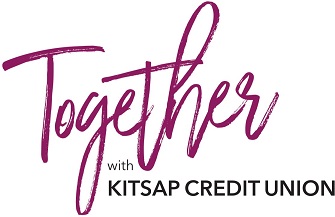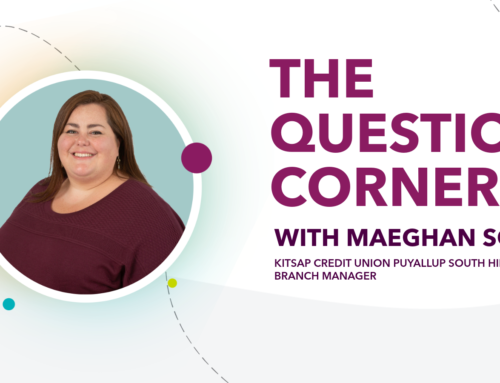 Meet Rory! At just six years old, Rory has already been a member at Kitsap Credit Union for over a year. Rory collects her savings in her purple KCU piggy bank and happily brings it in for deposit with her mom, Phoenix. “She thinks she’s saving up to buy us a new house,” said her mom, “But I’m assuming that in 10 years she will want that savings account to go toward her first car.”
Meet Rory! At just six years old, Rory has already been a member at Kitsap Credit Union for over a year. Rory collects her savings in her purple KCU piggy bank and happily brings it in for deposit with her mom, Phoenix. “She thinks she’s saving up to buy us a new house,” said her mom, “But I’m assuming that in 10 years she will want that savings account to go toward her first car.”
Did you know that children can form money attitudes and habits as early as age seven? It’s important to start teaching your kids about financial wellness early on to set them up for success in their teen and adult years. Here are six things to keep in mind while teaching your kids about financial wellness.
- Look for the teachable moments. This might mean letting your child hand the cashier their money when purchasing a new toy or snack. For a teen, this could mean talking about spending habits and budgets while out shopping.
- Teach them to save. Young children will observe how you spending money. This could be buying groceries, toys for them, or even trips and vacations. That’s why it’s also essential to demonstrate how to save. Finance expert Dave Ramsey recommends giving young kids a glass jar, instead of a solid piggybank. It provides a clear visual of just how many dollar bills and coins are piling up. Get your children started on the right path by showing them excitement around saving.
- Model money monitoring. Talk about the difference between a want and a need when your child asks to make a purchase. Sit down with your teen to go over their list of expenditures for the week. Discuss whether their purchases were wants or needs and if they could have spent their money differently.
- Show them how to budget. Teaching young children how to budget their money is an essential life lesson. As they’re no doubt zoned-into a device, download a simple budgeting app and get them started on the road to budgeting money.
- Teach your kids good beliefs about money. As parents, we have a big influence on the way our children will grow up to handle their finances. By modeling healthy beliefs and behaviors regarding money, you give your children an invaluable gift.
- Talk about the future. No matter what your child’s age is, talking about their future goals is a good way to help them plan ahead. Make financial goals, help them plan and save for the next phase of their life. For a young child, perhaps their first big purchase will be their first car, or maybe they are saving for college. Teach your teen about the importance of saving for emergencies and retirement. It’s never too early to have these conversations.
Looking for more ways to learn about Financial Wellness for kids? Try out It’s a Money Thing.






